Leicestarians looked at the snow falling, and read the unseasonal weather for significance. “Prince has just died, and he wrote a song called Sometimes it Snows In April,” said one man to his friend. “It’s a sign isn’t it.” His friend nodded sagely.
These are strange times in Leicester. Everybody is looking for signs. There is tension as well as a bitter cold in the air. Unbelievably, the local football team is on the verge of winning the Premier League. This is the same Leicester City that looked doomed to relegation last season until they were saved by a miraculous run of seven wins in nine games under the guidance of then manager Nigel Pearson. The team of has-beens, rejects and unknowns – now managed by 64-year-old also-ran Claudio Ranieri, nicknamed the Tinkerman – has morphed into a team of wonders.
Leicester City were 5,000-1 to win the league at the start of the season. Now, if they beat Manchester United on Sunday or Tottenham Hotspur lose to Chelsea on Monday, or both clubs draw, Leicester will be champions. In betting terms, it will be the greatest upset in British sporting history. Bookies deemed it more likely that Piers Morgan would be named Arsenal manager (2,500-1).
Even more astonishing, Leicester City, known as the Foxes, haven’t edged their way to the top, they have blown their rivals away. Leicester have won 22 of 35 league games, lost only three, stand seven points clear of Tottenham in second, and 29 points clear of last season’s champions Chelsea, whose squad cost five times more. Now it will be almost as big an upset if they don’t win the league.
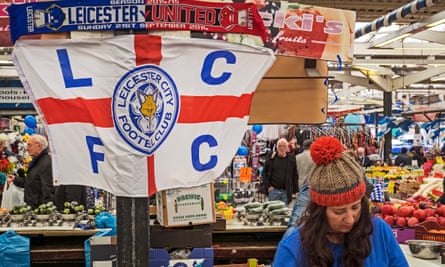
“Ten oranges a pound,” shouted the barrow boys. “Best English strawberries – two for £1.50.” The sign above the stall in Leicester’s celebrated fruit market says Lineker’s. It used to belong to the father of the city’s most famous footballing son, and this is where Gary Lineker started his working life. Today it is being manned by James Ferrar, a giant of a man at 6ft 10, with a smiley face and prominent ears. “I’m Gary’s cousin.” He grinned. “I’ve got the Lineker ears. Definite. And hairdo as well.” Ferrar was trying to keep a lid on his excitement. “The mood is crazy. This is absolutely massive. If we win the league, you’re going to see the biggest party you’ve ever seen in this country. In. The. Country.” He paused. “If,” he repeated, and crossed two huge fingers.
Rarely have so many fingers been crossed in one city. A hundred yards away at the clock tower, a handful of junior doctors were handing out leaflets. Gaz Bola, wrapped in his Foxes scarf, contemplated the nature of Leicester’s success. Was it a victory over unfettered capitalism? “I wouldn’t go that far. I think it’s a victory for teamwork. And it’s showing people money isn’t everything.”
Bola is right. This might be a David and Goliath story, but the English Premier League is global business. Even the Davids have sufficient funds to buy themselves a decent sling. Each Premier League team is expected to earn £81m from television rights this season. And yet in Premier League terms the Leicester squad cost a pittance – £54m, roughly the same as Manchester City’s most expensive player, Kevin De Bruyne.
Bola talked about what success was doing for the city. “Hotel-room occupation rates were 60% on Fridays and Saturdays before, and now they’re all full because people want to visit Leicester. And then there’s Richard III.”

Ah, Richard III. You can’t move in Leicester for signs directing you to his burial site. In 2013 it was confirmed that a skeleton found in a Leicester car park the previous year was the hunchback monarch.
Why celebrate the brutal king so wholeheartedly? Well, said, Bola, because he is another sign. “It all started with Richard III actually. If you look back, his burial was 31 March 2015 and Leicester were bottom of the table back then.”
“‘Dead and buried, you could say,” said his friend Prashant Shah. “Yes,” said Bola. “And then they went on that amazing run.”
Bola said the football was analogous to his situation as a junior doctor. “It shows how important it is to work as a team and stay united for your patients. That’s what we’re doing. And hopefully the underdog can win.”
Leicester is a unique mix of medieval and modern Britain. Its city gates and granite cross at Jubilee Square are reminders of its history. And only a short walk away today is Narborough Road, recently crowned Britain’s most multicultural high street, with shopkeepers from 23 different countries. In 2011 Leicester became the first British city not to have a white British majority.

De Montfort University belongs to modern Leicester, and is proud of its partnership with the football club. Students do work placements at the club, and foreign players such as the Japanese striker Shinji Okazaki learn English at the university.
On this day, the Leicester Mercury and BBC Radio Leicester had joined forces to turn the whole county blue as a show of support for the club. Meanwhile, De Montfort unveiled a huge banner to celebrate the club’s achievement, 31ft high and 16ft wide, hanging above the entrance to the university’s Hugh Aston building. The banner features images of Okazaki, Jamie Vardy and the newly crowned PFA player of the year, Riyad Mahrez, the French Algerian who cost only £400,000 when he signed last year.
Leicesterians tend to the cautious, and at the university they were making cautious claims for the banner. Fiona Dick, responsible for its funding, said: “We reckon it’s the biggest show of support for Leicester in the city.”
Neil Carter, a sports historian and senior research fellow who writes a column in the Leicester City matchday programme, racked his brains for an equivalent sporting achievement. He mentioned local rivals Nottingham Forest winning the league, but said that didn’t equate because they won before money took over football. “Ever since 92 and the Premier League there’s been an inevitability about the big clubs buying up the best talent and that talent being concentrated in fewer and fewer clubs. There’s an economic logic applied to football and what Leicester has done is a total blip.”
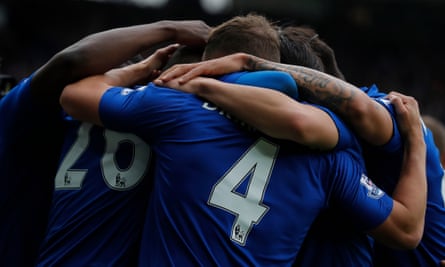
To put everything into context, he suggested visiting the club’s old ground. Filbert Street was demolished in 2003 after 110 years of football. As we walked, Carter and Chris Johnston, a former Leicester Mercury journalist, talked about how the city had been patronised over the years. People tend not know where it is, or mispronounce it. “People just think of Walker’s crisps when they think of Leicester,” Johnston said. “We’re proud of our crisps, we’ve got the biggest crisp factory in the world here, but there is more to us than crisps. Did you know that in the 1930s because of the textile industry we were the second richest city in Europe?” He also pointed out that despite the club’s modest size, it had had more than its share of footballing legends – Lineker, Gordon Banks, Peter Shilton, Frank Worthington.
Filbert Street was the ultimate working-class ground (while the football club attracted largely working-class fans from the city, the rugby union club has always been more middle-class and county-based). “It is the oddest ground I’ve ever visited,” said Carter. Three of the stands were single-tier, the fourth was a double-decker built in the 1990s. “The former manager Martin O’Neill said whenever he was signing a new player he’d show them the new stand, then walk them out backwards so they always saw the double-decker and it looked like a top-class stadium.” The turnstile was a gap between two terraced houses, and the urinal for the East Stand overlooked the gardens in Burnmoor Street.
Today, Filbert Street is a wasteland, and 21-year-old Leicester fan Emma Thompson isn’t happy about it. “It’s an eyesore. Disgusting. You’ve got weeds growing, broken bottles, rubbish dumped,” she said. “You’d think they’d clean it up, make something of it with Leicester now top of the league. Come on! Sort it out!”

Seventy years ago Leonard Cook used to watch the football standing on a box in the front bedroom of his Filbert Street home. He invited me in to look at his scrapbooks. His pride and joy is a photograph of his younger self, featured in a history of Leicester. “That little lad with Don Revie is me in 1947,” said Cook. “That photo is blown up in a big frame in the new King Power stadium.”
Cook fell out of love with football when money took over. Leicester might be standing on the shoulders of giants, their team might be bargain basement, but even they have a billionaire owner, Vichai Srivaddhanaprabha, a Thai businessman who founded King Power Duty Free. “Football’s just a business now, it’s not sport,” said Cook. He stopped attending matches when Leicester moved stadiums.
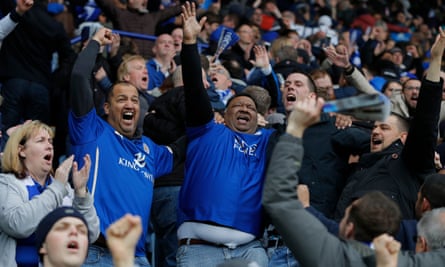
But even he is excited by the club’s success, recently treating himself to a new Leicester City lapel badge. “If they win the league it would be a monstrous achievement. Monstrous.” Would he return to football? “I doubt it. I’ve heard it’s about £30 to get in.” I told him that tickets for the final game of the season were reputedly exchanging hands for £7,000. He tutted. “Yes, I heard that someone had put up ticket on eBay for amazing amount of money.”
Over at the tattoo studio Blue Ink, Scott Tynan told me business was fine but not remarkable. Has anybody had a “Champions” tattoo done yet? “Nonono,” said Tynan who co-owns the studio with Leicester City’s captain, Wes Morgan. “Nobody wants to pre-empt it, nobody wants to put the knockers on it. Mind you, we are hoping for an influx next week.”
Outside the city, past the mansions and gated properties in Stoughton, the former Leicester captain Matt Elliot was coaching De Montfort University’s football teams in the varsity series against the University of Leicester. De Montfort won all four matches – another victory in football’s class war. Leicester University, up on the hill, has always been regarded as posher than De Montfort, formerly a polytechnic. At football matches, Leicester students sing “Your dad works for our dad” while De Montfort students chant back: “You can shove your silver spoon up your arse.”
Elliott, who scored both Leicester goals in the 2000 League Cup final victory over Tranmere, said success had been good for him personally. “I’m a busy man of late with media interest from all over the world.” Other countries seem even more entranced by Leicester’s turnaround than England. One Japanese camera crew has been in the city for weeks just to report on Okazaki.
Elliott was watching two of his football teams on parallel pitches as we talked. “I’ve been here 19 years. Semi-adoptee Leicester lad. I’ve got a deep affection for the city and club.” A group of players cheered and ran over to mob him. “There’s another one. We’ve won again! Happy days!”
Leicester are the pride of the Midlands for sure, aren’t they? “Pride of the country, I think, in most people’s eyes, if and when they do it,” Elliott said. Again that familiar pause. “I said if and when …”
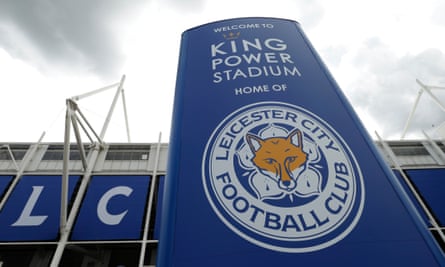
Outside the fan store at the King Power stadium is a large notice: “LCFC tickets for the following fixtures are now sold out. Manchester United sold out. Everton sold out. Chelsea sold out.” All matches are sold out.
Inside the store, senior citizen Katherine Hickinbotham is buying a “European tour 2016/17” T-shirt for her husband. “I’m going to be a bit annoyed if we do win the league because I’ve booked a holiday in Ibiza and I’ll miss the celebrations,” she said. She stressed she was only joking, just in case, you know …
“When we go on holiday they say where d’you come from, we say Leicester and they say never heard of it, so you have to mention Birmingham or Nottingham. Now I’ll go to Ibiza and people will know where I’m from all right, won’t they?”
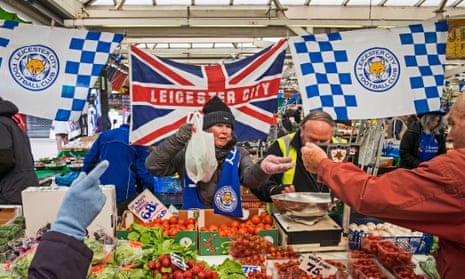
Comments (…)
Sign in or create your Guardian account to join the discussion